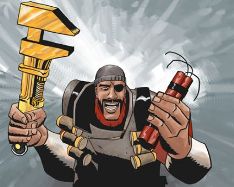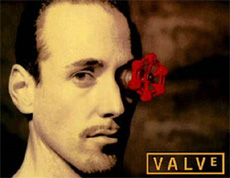
On Wednesday, JJ Abrams and Gabe Newell sat down for a session at the 2013 DICE summit where they discussed the strengths and weaknesses of games and movies as storytelling mediums. Polygon has a liveblog of the chat, and it’s definitely worth reading to get a sense of their alternating points. Newell argued for the value of player agency, of letting gamers be “architects of their own amusement”, whereas Abrams argued in favor of film’s “machinery” of storytelling, which allows for narrative control. They played clips from games and movies, and each made some excellent, thoughtful arguments.
Their discussion of the different forms of storytelling was especially exciting because they ended by announcing that Abrams and Valve are planning on collaborating on a game as well as possible Portal or Half-Life movies. If it’s even possible to make a decent movie out of a game, I think JJ Abrams could be the guy to do it. However, of the two properties, I think Half-Life is a bit better suited to the movie treatment, simply because there are more characters and settings to work with. Of course, Gordon Freeman would definitely end up talking in a movie version, and that might ruin some of his carefully cultivated mystique…
How about you? Do you find the prospect of a Portal or Half-Life movie exciting? Will you be curious to see what kind of game Abrams might make with Valve? How much would your head explode if a Half-Life movie came out before Episode 3? Let us know in the comments.
Source – Polygon





 A growing topic within the video game industry this generation has been the rising cost of development. This leads not only to higher prices, but to publishers being less willing to take a chance on new properties. Heck, it was just revealed last week that Crackdown, which sold 1.5 million copes and then some,
A growing topic within the video game industry this generation has been the rising cost of development. This leads not only to higher prices, but to publishers being less willing to take a chance on new properties. Heck, it was just revealed last week that Crackdown, which sold 1.5 million copes and then some,